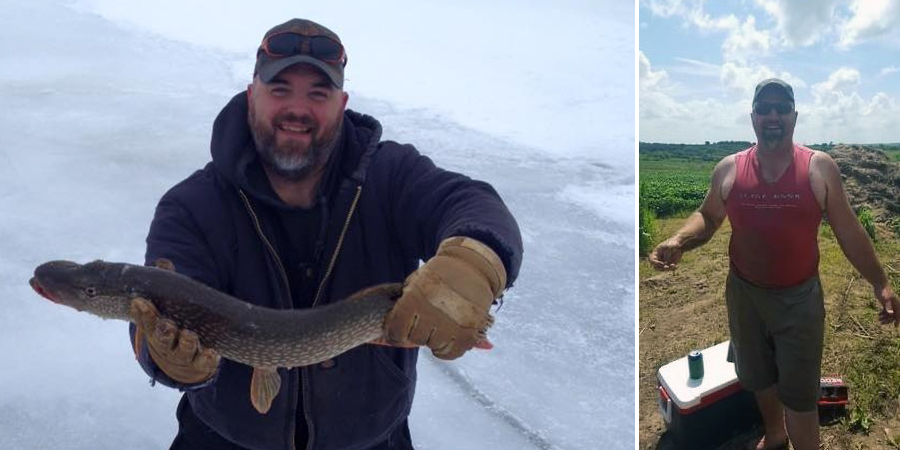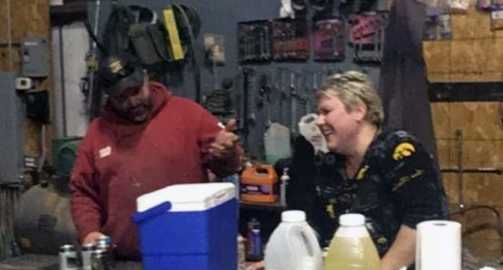January 25, 2021
Last February Live On Nebraska team members watched as ambulances and vans arrived across the street at UNMC, carrying cruise ship passengers recently diagnosed with COVID-19. The news was heavy with stories surrounding the virus, but we had no expectation of how it would soon affect us or our donation community.
Nearly a year later, we reflect on 2020 with gratitude, determination and pride.
Despite the challenges COVID presented our staff, partners and donor families, hope and generosity prevailed.
In 2020, more donors gave the gift of life in Nebraska than ever before.

Scott Vandemark was one of those donor heroes.
On Thanksgiving Day, Scott’s girlfriend, Amber Oliver, received a phone call from the Live On Nebraska team caring for her boyfriend at Nebraska Medicine. A match had been found for Scott’s heart.
“I just felt it was so fitting,” said Amber, a cardiac nurse. “There was so much to be thankful for all around…that so much good could come out of such an unexpected and awful event.”
Scott, Amber says, was a hard-working, give-the-shirt-off-his-back kind of guy. He spent his days working as a truck driver and devoted his free time to his two sons, Devin and Noah, the great outdoors and oftentimes, a good practical joke. He was a social butterfly known for his boisterous, contagious laugh.

Scott and Amber were classmates in bible school through college. They each took separate paths after school, but their friendship remained strong until they came together as a couple in August 2020. Amber believes the timing was fortuitous, ultimately allowing her to carry out his wish to be a donor.
“He was always the guy that would go out of his way to help a stranger,” Amber said. “With everything he owned, he felt it was better for someone else to get some use out of it if he no longer could.”
But Scott’s ability to donate came as surprise to Amber.
When he was admitted to the hospital for a stroke in mid-October, it was discovered that Scott was COVID-19 positive. He improved after several weeks in the hospital, but suffered two additional, more severe strokes—the third ultimately stopped the flow of oxygen to his brain.
“I knew that he was a registered organ donor,” said Amber. “But I was doubtful any donation would be welcomed.”
Dr. Lee Morrow, Live On Nebraska’s medical director, says donation from patients who were previously COVID-positive are safe.
“As we currently understand the coronavirus, any organ can potentially be transplanted from a donor who has recovered from a previous COVID-19 infection,” Morrow said. “But because the virus primarily infects the respiratory system, transplantation of lungs post-COVID infection hasn’t been embraced.”
To ensure the safety of potential recipients, two COVID PCR tests must come back negative from any potential donor. Morrow says PCR tests are highly sensitive and can even detect viral particles weeks after a patient has recovered from the virus.

When the opportunity for donation became possible for Scott, Amber was fully on board.
“When all the initial tests came back, the team was so optimistic,” Amber said. “It gave us so much hope.”
Scott was able to donate four organs, saving the lives of three grateful recipients. His donated tissues have the potential to provide healing to more than 100 people in the future.
Amber says Scott would think it’s “pretty cool” that the last thing he did on Earth was help so many people with a simple act. And equally wonderful, she adds, “that I got to be the friend that helped him achieve his greatest gift.”
In the 10 months since COVID-19 reached Nebraska, partnership and adaptability have been essential to making donation and transplantation possible.
In March, as the nation began to shut down, our office staff began working from home where they remain today. Through technical challenges, homeschooling and Zoom meetings, they’ve remained committed to ensuring the quality of our work, meeting demanding IT needs, hiring and caring for employees and finding ways to honor our donor heroes virtually.
At the same time, our organ and tissue teams show up each day to care for donors in our office and at hospitals throughout the state. Their work requires more testing, more safety precautions, more communication, more coordination and extreme flexibility. Despite these challenges, they recovered more organs and tissues than ever before.
In 2020, our Communications Center processed 11,007 donation referral calls – a 15 percent increase from the previous year. This increase means they also spent more time on the phone with funeral homes, law enforcement, EMS and other donation partners. They spent countless hours helping donor families process their loss. Without their work, hope and healing is not possible.
As hospitals converted hallways to COVID units and limited visitors, our hospital services and family services teams leaned into our partners and relied heavily on them to fill in the gaps where we would normally be. Physicians, nurses, respiratory therapists and support staff went above and beyond to facilitate donation, care for donor families and honor our donor heroes.
In a time of unprecedented change and uncertainty, our donation community’s commitment to saving and healing has never wavered. To the donors and donor families who said “yes” during this difficult time, we will never forget your generosity. To our staff and dedicated partners, your work speaks for itself. 2020 will be remembered not just for its great adversity, but everything you overcame to achieve a new record for donation in our state. Thank you.

